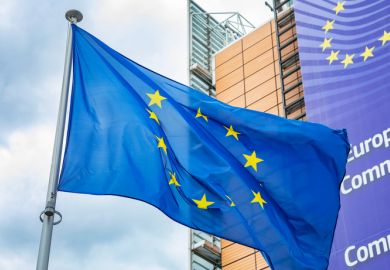Adopting a European degree label could be an impactful “first step” towards a pan-continental qualification, sector leaders have said, in the wake of a series of Brussels-led pilot projects.
In December, the European Commission published a report on six pilot projects that trialled the concept of a European degree label. The projects, which ran from 2023 to 2024, spanned 25 countries and incorporated 140 higher education institutions as well as government ministries, student organisations and quality assurance agencies.
According to the report, those involved in the pilot projects “broadly concluded that a European degree would represent an enormous advancement in European higher education and create unprecedented opportunities to improve excellence and competitiveness in European higher education”.
Nevertheless, the participants also compiled more than 50 barriers “preventing higher education institutions from seamlessly offering joint programmes and awarding joint degrees across EU member states”. Among the obstacles cited were incompatibilities concerning programme duration, curricula, accreditation requirements, mandatory languages of instruction “and even the thickness of the diploma paper”.
Maria Kelo, director of institutional development at the European University Association (EUA), told Times Higher Education that it would be an “incredible shame” to delay adoption of a European degree label, which could be awarded to students upon completion of joint degree programmes that meet agreed criteria.
“The label is a low-risk solution for the interim. It doesn’t require any regulatory changes in countries, except perhaps very minor softening of quality assurance regulations,” Kelo said.
“Maybe by experimenting more with the label, countries might come to see that there are benefits that are worth the minor risks they might need to take if they adopt the European degree.”
Touko Närhi, adviser for benchmark and higher education at CESAER, an organisation of European science and technology universities, echoed Kelo’s comments. “The label may be the most appropriate intermediate step, particularly due to the reservations some member states still have towards the initiative,” he said.
“While the label only goes so far to simplify the delivery of joint programmes, it has the potential to create renewed momentum for creating a level playing field within the European Education Area and beyond.”
Perhaps more remote, both Kelo and Närhi said, was the establishment of an entirely new degree that would be automatically recognised across the European Union, defined by the commission as “a voluntary European framework to simplify the development, implementation and recognition of joint degree programmes and joint degrees developed and awarded jointly by several institutions from different countries”.
“I think that’s where the member states are a little bit concerned,” Kelo said. “They say, ‘How can we have, within our own legal structures and legal regulatory frameworks, a degree over which we don’t really have full control?’”
Because the EU has limited competence in higher education, she noted, countries would be required to voluntarily adopt a new European degree framework without any existing proof that its purported benefits would come to fruition.
“For example, to say that European higher education will become more attractive globally because of the European degree – it might, but we don’t actually have any evidence,” said Kelo. “For member states, it’s a bit like a leap in the dark.”
A European degree would require significant financial contribution from participating countries, said Närhi: “Ensuring the degree remains inclusive and accessible, not limited to only those who can afford it, while preventing excessive administrative and financial burdens on institutions will require dedicated funding and structural support.”
The most significant barriers to a European degree qualification include “inconsistent quality assurance and recognition procedures”, he added. “Legislative barriers must be addressed, and continued efforts are needed to demonstrate the initiative’s added value to member states.”
Still, the European degree label could help to bring member states on board, the experts told THE. “I think our message is, ‘Let’s not be too worried about what might or might not be possible for the European degree,’” said the EUA’s Kelo. “Let’s just go ahead and experiment with the label and see what comes out of it.”
Register to continue
Why register?
- Registration is free and only takes a moment
- Once registered, you can read 3 articles a month
- Sign up for our newsletter
Subscribe
Or subscribe for unlimited access to:
- Unlimited access to news, views, insights & reviews
- Digital editions
- Digital access to THE’s university and college rankings analysis
Already registered or a current subscriber?








